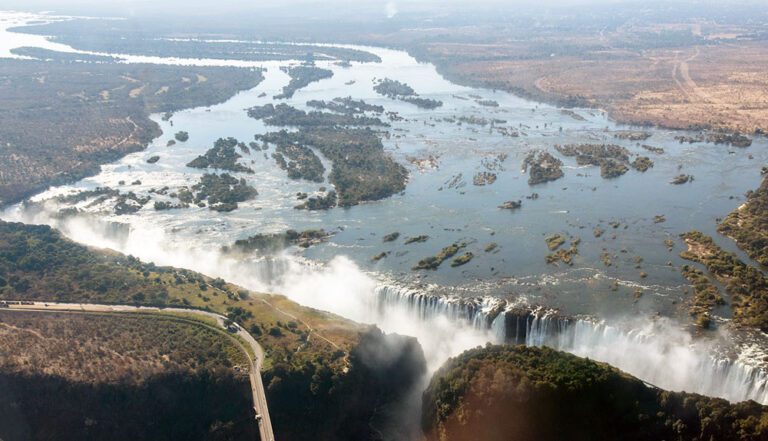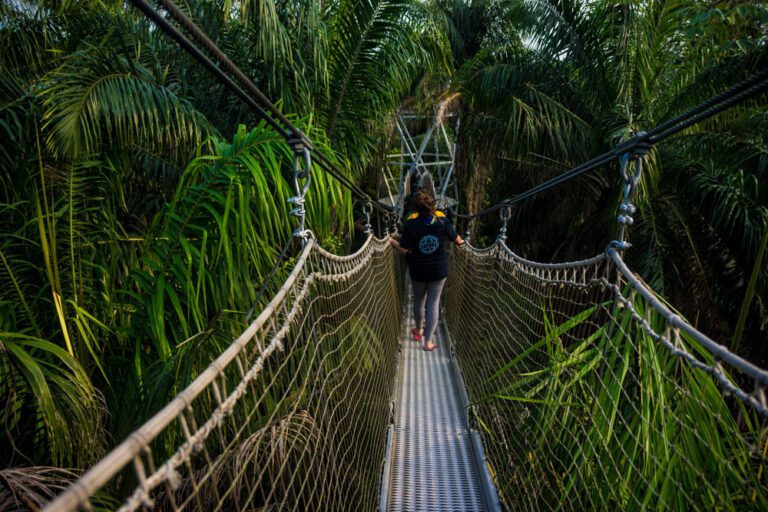Where not to go in Africa
Last updated on October 17th, 2022 at 11:14 am
For the most part, using common sense can keep you safe in most places in Africa, but some countries and locations are dangerous for tourists.
If you’re planning a trip to Africa and have questions regarding the security of your chosen location, consider reading the U.S. government’s travel advisories.
What Are Travel Warnings?
The U.S. government publishes travel warnings or advisories to let its citizens know about the dangers involved with visiting a particular area or country.
They are based on assessments of the nation’s political and socioeconomic situation made by experts. Travel warnings are frequently issued in the wake of unexpected catastrophes like civil wars, terrorist attacks, or political upheavals.
Additionally, they may be issued in response to persistent social unrest, high crime rates, or health-related reasons. Travel advisories are ranked from level 1 to level 4.
Level 1 means “exercise normal precautions,” which essentially means that there are no special safety concerns at present.
Level 2 means “exercise enhanced caution,” which means there is a small amount of risk in some locations, but you should still be able to travel safely as long as you are aware of the risk and take appropriate precautions.
Level 3 means “reconsider travel,” which means that any travel, save for the absolutely necessary, is not advised.
Level 4 means “do not travel,” indicating that the environment is too risky for travelers.
For additional information regarding the circumstances that may have prompted specific travel advisories, have a look at the advice given by other governments, such as Canada, Australia, and the United Kingdom.
Current US Travel Advisories for African Countries
Below is a list of all African countries having Level 2 or higher travel advisories.
Please be aware that travel warnings constantly change. It is still advised to consult the U.S. Department of State website directly before making travel plans.
Algeria
Due to terrorism, a level 2 travel advisory was issued. Attacks by terrorists can occur suddenly and are thought to be more likely in rural locations. Traveling to rural areas within 50 kilometers of the Tunisian border or within 250 kilometers of the borders with Libya, Niger, Mali, and Mauritania is specifically discouraged by the warning. In the Sahara Desert, traveling by land is likewise not advised.
Burkina Faso
Crime, kidnapping, and terrorism have caused the level 3 travel advisory to be issued. Violence against foreign nationals is a common problem, especially in urban areas.
Attacks by terrorists have happened and might do so in the future. For a number of places in the nation, including Arrondissement 11 in Ouagadougou and 11 regions, including the Sahel, Cascades, and Boucle du Mouhoun, the advice raises the classification to a Level 4.
Burundi
Due to criminality and political unrest, a level 3 travel advisory has been issued. There are many violent crimes, including grenade attacks.
The political unrest that persists leads to sporadic bloodshed, and military and police checkpoints may impede freedom of movement. In the provinces of Cibitoke and Bubanza, in particular, cross-border raids by armed groups from the DRC are frequent.
Cameroon
Due to crime, a level 2 travel advisory was issued. Cameroon as a whole struggle with violent crime, while certain regions are worse than others. The government specifically recommends against traveling to any section of the North, Far North, Northwest, or Southwest, as well as the East and Adamawa districts. The likelihood of terrorism and armed conflict is also increased in several of these regions.
The Central African Republic
A Level 4 travel advisory was issued due to criminality, civil upheaval, and kidnapping. Armed organizations have authority over significant portions of the nation and frequently target people for kidnapping and murder, and armed robberies, murders, and severe attacks are widespread. In the case of civil disturbance, borders on the land and in the air may be abruptly closed, leaving travelers stuck.
Chad
Travel advisories of level 3 have been issued owing to crime, terrorism, and minefields. Since 2018, more violent crimes have been reported, and terrorist organizations are particularly active around Lake Chad and have easy access to the country. Unexpected border closures could leave travelers trapped. There are minefields along the border with Libya and Sudan.
Côte d’Ivoire
Due to crime and terrorism, a level 2 travel advisory was issued. Attacks by terrorists are possible at any time and are likely to target popular tourist destinations, particularly those near the northern border. The prevalence of violent crimes (such as carjackings, break-ins, and armed robberies) outweighs the minimal assistance that U.S. government officials can offer because they are not allowed to drive outside of major cities after nightfall.
The Democratic Republic of the Congo
Due to criminality and civic upheaval, a level 3 travel advisory has been issued. Political protests are tense and frequently prompt a strong response from law enforcement, and there is a high rate of violent crime. Due to continuous armed conflict, the three provinces of the Kasai and the eastern Congo are ranked as Level 4. The levels of crime, Ebola, and abduction are also level 4 in the provinces of North Kivu and Ituri.
Egypt
Due to terrorism, a Level 2 travel advisory was issued. While civil aviation is thought to be in danger, terrorist organizations continue to target tourist attractions, government buildings, and transit centers. However, a lot of the major tourist destinations in the nation are very secure. In the meantime, it is not advised to travel to the Western Desert, the Sinai Peninsula (save for Sharm el-Sheikh), or the border regions.
Eritrea
Due to travel restrictions, a lack of consular support, and landmines, level 2 travel advice was issued. It is possible that local law enforcement may prevent you from receiving assistance from the U.S. Embassy if you are detained in Eritrea. Many distant and/or rural sections of the nation, including (but not limited to) Nakfa, AdiKeih, and Arezza, are at risk from landmines.
Ethiopia
Due to the possibility of civil disturbances and communication interruptions, a level 2 travel advisory was issued. Due to the risk of kidnapping, terrorism, and landmines, travel to the Somalian border region is not recommended. Additionally, regions like the East Hararge region of Oromia state and the borders with Kenya, Sudan, South Sudan, and Eritrea are seen to be at risk for armed conflict and/or civil unrest.
Guinea
Civil unrest has caused a Level 2 travel advisory to be issued. Political protests are frequent and frequently unplanned. While protestors are likely to target drivers who try to move through or around protest activities, some have in the past resulted in major injuries or fatalities. Those who are stranded in the congestion brought on by demonstrations may be the victims of opportunistic robbers.
Guinea-Bissau
Due to criminality and civic upheaval, a level 3 travel advisory has been issued. Throughout Guinea-Bissau, violent crime is an issue, but it is particularly bad around the airport and at Bandim Market in the heart of the city. The conflict between factions can result in violence breaking out at any time, and political upheaval and societal disintegration have existed for decades. No American embassy exists in Guinea-Bissau.
Kenya
A level 2 travel advisory was issued due to crime, terrorism, and kidnapping. Tourists are advised to avoid the Eastleigh and Kibera neighborhoods of Nairobi at all costs and to use caution while going out after dark because violent crime is an issue throughout Kenya. Due to the threat of terrorism, the Kenya-Somalia border, some coastal regions, and portions of Turkana County are rated Level 4.
Libya
A Level 4 travel advisory was issued due to crime, terrorism, armed conflict, kidnapping, and civil upheaval. There is a significant likelihood of being involved in violent extremist activities, and terrorist organizations frequently target foreign nationals (and U.S. citizens in particular). Given the threat of terrorist attacks on civil aviation, flights into and out of Libyan airports are frequently canceled, stranding tourists.
Malawi
Civil unrest has caused a Level 2 travel advisory to be issued. Political protests that were planned have taken place recently in cities all around the nation. These rallies frequently involve vandalism and looting, for which police have been known to retaliate violently, including by using tear gas.
Mali
Travel advisories of level 4 have been issued because of crime and terrorism. While violent crime is pervasive throughout the nation, it is most prevalent in Bamako and the southern parts of Mali. Corrupt police officials are able to prey on visitors through roadblocks and random police checks, especially at night. Attacks by terrorists continue to target locations that are popular with foreigners.
Mauritania
Travel advisories of level 3 have been issued because of crime and terrorism. Terrorist strikes could happen suddenly and are probably going to target locations that Western visitors frequent. Assaults and muggings are widespread, and U.S. government representatives may only offer limited aid in an emergency because they need special clearance to leave Nouakchott.
Morocco
A terrorism-related level 2 travel advisory was issued. Terrorist organizations are still preparing strikes in Morocco that might hit both public transportation hubs and popular tourist spots. These assaults might come on suddenly and be unpredictable. Travelers are encouraged to stay as far away from protests and gatherings as they can.
Niger
Crime, terrorism, and kidnapping have led to the issuance of a Level 3 travel advisory. Terrorist attacks and kidnappings target foreign and local government installations as well as tourist-friendly regions, while violent crimes are frequently committed. Avoid going to the border areas, in particular, especially the Diffa, Lake Chad, and Malian borders, where extremist organizations are known to operate.
Nigeria
Crime, terrorism, civil unrest, kidnapping, and piracy have all led to the issuance of Level 3 travel advice. In Nigeria, violent crimes are frequent, and the northeast is particularly vulnerable to terrorist strikes. Due to the potential for terrorism, the states of Borno, Yobe, and northern Adamwa are classified as Level 4. Travelers should steer clear of the Gulf of Guinea due to the threat of piracy.
Republic of the Congo
A Level 2 travel advisory has been issued because of crime and unrest. In the Republic of the Congo, violent crime is a problem, and there are frequently violent political protests. Tourists are cautioned against visiting the southern and western districts of the Pool Region because of the increased risk of armed conflict and civil disturbance brought on by current military operations there.
Sierra Leone
There is a Level 2 travel advisory because of criminality. Although violent crimes like assault and robbery are frequent, local authorities are rarely able to handle such occurrences with effectiveness. Since U.S. government officials are prohibited from leaving Freetown after nightfall, they can only provide limited support to tourists who run into problems.
Somalia
A level 4 travel advisory was issued in response to crime, terrorism, kidnapping, and piracy. A high incidence of kidnappings and killings, frequent illegal roadblocks, and violent crimes are all too common. Attacks by terrorists frequently happen without warning and are directed at Western tourists. The international waters off the Horn of Africa are riddled with piracy, particularly close to the Somalian coast.
South Africa
Crime, instability, and drought all led to the issuance of a Level 2 travel advisory. In South Africa, violent crimes such as armed robberies, rapes, and smash-and-grab attacks on cars are frequent, especially after dark in the central business districts of major cities. Political demonstrations are common and can become violent. There may be water restrictions in place because of the severe drought that is affecting the provinces of the Western, Eastern, and Northern Cape.
South Sudan
As a result of crime, kidnapping, and armed conflict, level 4 travel advice was issued. While violent crime is prevalent, there is ongoing armed warfare between various political and ethnic factions. U.S. government officials are typically only allowed to travel in armored cars due to the severe crime rates in Juba. The inability of tourists to rely on assistance in an emergency is caused by restrictions on official travel outside of Juba.
Sudan
Crime, terrorism, civil unrest, kidnapping, and armed conflict have all led to the issuance of a Level 3 travel alert. Sudan is home to members of well-known terrorist organizations who may target Westerners. Armed opposition organizations are active in the Central Darfur, Blue Nile, and South Kordofan states, and violence is frequent along the borders with South Sudan and Chad.
Tanzania
A level 2 travel advisory has been issued because of crime, terrorism, health problems, and the targeting of LGBTI people. In Tanzania, violent crimes such as sexual assault, kidnapping, muggings, and carjacking are frequent. Attacks by terrorist organizations are still being planned against tourist hotspots in the West. Unconfirmed claims of an Ebola outbreak in Dar es Salaam surfaced in September 2019.
Tunisia
A terrorism-related level 2 travel advisory was issued. Some places are seen to be more vulnerable to attack than others. Travel to Sidi Bou Zid, the desert south of Remada, the regions along the Algerian border, and the northwest hilly regions is not recommended, according to the authorities (including Chaambi Mountain National Park). Additionally, it is not advised to travel within 30 kilometers of the Libyan border.
Uganda
A level 2 travel warning has been issued because of criminality and kidnapping. Although many parts of Uganda are seen as being reasonably safe, the country’s main cities have a high prevalence of violent crimes, such as armed robberies, home invasions, and sexual assaults. Visitors are urged to exercise extra caution in Entebbe and Kampala. The local police force is underequipped to deal with emergencies.
Zimbabwe
A Level 2 travel advisory has been issued because of crime and unrest. Political unrest, which may manifest as violent protests, has been caused by political upheaval, economic hardship, and the effects of the current drought. Areas that are popular with Western tourists frequently experience violent violence. Visitors are discouraged from showing off obvious riches.







